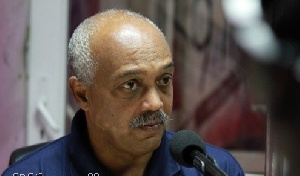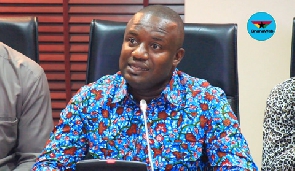Speeches by the vice-presidential nominee of the New Patriotic Party (NPP) always send “shivers within the NDC”, Sydney Casely-Hayford, a member of OccupyGhana, has claimed.
For him, the dexterity with which the former Second Deputy Governor of the Bank of Ghana uses data and figures to his advantage always gets the governing party flummoxed.
Mr Casely-Hayford argued that the lecture held by Dr Bawumia titled ‘State of the Ghanaian Economy – A Foundation of Concrete or Straw’ on Thursday September 8 was a “political campaign” and the purpose of the delivery was to reinforce that the NPP performed better in its eight years in government under ex-president John Agyekum Kufour than the NDC under ex-President John Evans Atta Mills and more importantly under President John Dramani Mahama.
Critics like think tank IMANI Ghana have accused Dr Bawumia of not being consistent, especially with the dollar rates he used for his analysis.
But Mr Casely-Hayford, who was a guest on Citi FM’s The Big Issue on Saturday September 10, maintained that since it was a political speech, Dr Bawumia was not obliged to do that since he wants to point out faults within the government.
But the Minister of Roads and Highways, Inusah Fuseini, who was on the same programme, indicated that the conduct of Dr Bawumia rather “challenges his credibility as an economist”.
For him, Dr Bawumia is becoming “politically spent”. He stated that politics is now influencing his objectivity in making economic analysis.
Dr Mahamudu Bawumia, at his lecture, said the achievements of the NPP under ex-President John Agyekum Kufuor could not be rivalled by those of the National Democratic Congress (NDC).
“Virtually every single economic indicator proves that while the eight years under the NPP between 2001 and 2009 were better than these last eight years under the NDC, the NDC’s first four years under late President Mills were even far better than these last four years under John Mahama,” he noted.
“Under the eight years of the NPP government, from 2001-2009, taxes and loans amounted to GHS20billion. In contrast, taxes, oil revenue, and loans alone over the eight-year period of 2009-2016 would amount to some GHS248billion. The Mills-Mahama governments would have had in eight years more than 12 times the nominal resources that the NPP had."
GDP Growth
In terms of GDP growth, Dr Bawumia noted that without oil, the NPP competently managed the economy to increase growth from 3.7% in 2000 to 9.1% in 2008, while with oil and unprecedented resources, economic growth declined to 3.9% in 2015.
“Between December 2000 and December 2008, without oil, economic growth increased from 3.7% to 9.1%. After declining to 4.8% in 2009, real GDP growth increased to 7.7% in 2010 and 14% in 2011 following the onset of oil production. Since 2011 however, real GDP growth has declined steadily and drastically to 3.9% in 2015, basically the growth rate Ghana attained in the year 2000,” Dr Bawumia said.
He further stated: “Between 2000 and 2008, the size of Ghana’s economy increased from some $5.1 billion to $28.5 billion, a 459% increase in eight years. Even in the face of a global economic and financial crisis in 2007/8 (with oil prices reaching a record high of $147/barrel), economic growth in 2008 rose to 9.1%. Ghana’s GDP, notwithstanding the discovery of oil, has only increased from $28.5 billion in 2008 to a projected $40 billion in 2016 (a 40% increase in eight years). However, between 2012 and 2016 i.e. during John Mahama’s tenure as president, the economy, in dollar terms, shrunk by 5%.”
GDP Per Capita
Similarly, Dr Bawumia explained that under Mr Mahama, the per capita income had amazingly declined by 12% despite all the prevailing opportunities.
“Under the NDC, GDP per capita has recorded a growth of 17% (from $1,266 to a projected $1,481) with oil revenue. Under John Mahama’s tenure as president (2012-2016), GDP per capita has declined by 12%. Under NPP on the other hand, GDP per capita recorded a growth of 187% in 8 years (from $440 to $1,266) without oil revenues. While the NPP increased per capita incomes by $826 during its term, the NDC, with twelve times more resources, has increased per capita incomes by only $215. With 12 times less resources, the NPP increased GDP per capita by some four times more than the NDC. This is essentially the difference between competent economic management and incompetent economic management. It also tells us that fundamentally, Ghana’s problem is not about resources. Our problem is the efficient and honest management of our resources.” he said.
Minimum Wage
Again, Dr Bawumia disclosed that under the tenure of Mr Mahama, the minimum wage had declined by some 23.6% and that in all, the minimum wage under the eight-year NDC administration had declined by 4% in dollar terms.
“In dollar terms, under the NDC, the minimum wage declined from $2.12 to $2.02 by 2016 (i.e. by 4.6%). Between 2012 and 2016 (during the tenure of President Mahama) the minimum wage in dollar terms declined by 23.6%! In comparison, the NPP increased the minimum wage from the equivalent of $0.62 in 2000 to $2.12 in 2008 (i.e. by 244%),” he underscored.
Fiscal Deficit
As a mark of the incompetence and recklessness of the Mahama administration in the area of economic management, Dr Mahamudu Bawumia noted that for the first time in Ghana’s history, Ghana had recorded three consecutive years of double digit deficits.
“At the heart of Ghana’s current economic difficulties is the government’s reckless management of public finances; especially in the run-up to the 2012 elections, over which John Mahama presided as President. We should recall that the economy ended in 2012 with a fiscal deficit of 12.2% of GDP, 11.7% of GDP in 2013 and 11.9% of GDP in 2014.”
According to him, this was the first time in Ghana’s history that double-digit fiscal deficits were recorded for three consecutive years (and this occurred under John Mahama’s presidency).
Public Debt
He further disclosed: “Another critical area which underlines the incompetence of the John Mahama-led NDC administration is the unprecedented borrowing that has been undertaken. From 9.5 billion Ghana cedis in 2008, the NDC has incredibly increased Ghana’s total debt to GHS105billion.
“In the last seven years alone under this NDC government, Ghana’s total debt has ballooned from GHS9.5 billion to GHS100 billion by the end of 2015 and GHS105 billion in May 2016. Some 66% of Ghana’s debt, GHS69billion of it, has been accumulated under the presidency of John Dramani Mahama in just the last three and a half years!”
Exchange Rate
Dr Mahamudu Bawumia also touched on the fall in the value of the cedi, which had seen the cedi gain notoriety for being one of the worst performing currencies in recent years. “The Ghana cedi has recently obtained the dubious distinction of being one of the worst performing currencies in the world as a result of weak fundamentals and some misguided policies by the central bank. The cedi has depreciated from some GHS1.2 to the dollar in 2009 to GHS 3.95 (almost GHS4) to the dollar currently. This is in contrast to the remarkable stability of the cedi during the eight years of the NPP government,” Dr Bawumia revealed.
“In terms of exchange rate depreciation, the worst performance between 2001 and 2016 has been between 2012 and 2016 (during the tenure of John Mahama as president).”
Dr Mahamudu Bawumia reiterated that in terms of economic performance, the Mahama government had been the worst and noted that it was time for change to salvage Ghana and its economy.
“The fact is that the worst period of economic performance since 2001 has been under President Mahama’s stewardship between 2012 and 2016. The truth is that the foundation was already laid by the Kufuor government. President Mahama has spent the last eight years destroying this foundation; replacing it rather with a weak foundation of straw which he desperately tries to portray as one of concrete. A mason who inherits a good foundation and spends eight years destroying it cannot be trusted to build the house. We need a competent mason, one with integrity, credibility and vision to build the house.”
General News of Saturday, 10 September 2016
Source: classfmonline.com

















